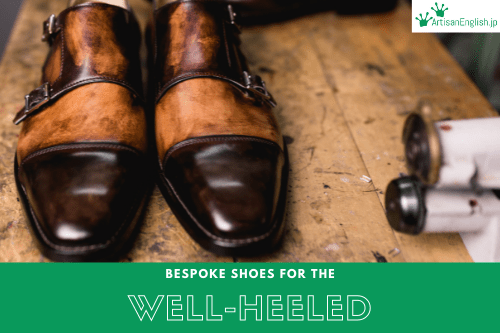
YouTube / iTunes / Spotify / Radio Public / Pocket Casts / Google Podcasts / Breaker / Overcast
Listen to ArtisanEnglish.jp posts & lesson intros here.
WotD: Well-heeled
Have you ever purchased a handmade pair of shoes?
I haven’t, but if you have, then you can genuinely say you are well-heeled.
Our word for today doesn’t refer to the quality of your shoes but the quantity of money in your bank account.
When we describe someone as being well-heeled, we mean they are wealthy.
Of course, like many idioms, it does have a literal meaning.
A few hundred years ago, all footwear was handmade.
That meant only the rich could afford a pair of properly fitting shoes.
Everyone else had to make their own or wear secondhand shoes.
When industrialization began in the 1830s, one of the first things mass-produced was men’s shoes.
This resulted in shoes being more readily available to the working classes, but the well-heeled were still the ones who were rich and could afford to purchase bespoke shoes.
They do say the clothes make the man.
Even today, a good pair of handmade shoes could run into thousands of dollars.
The recently deceased drummer for the Rolling Stones, Charlie Watts, was famously known for his dapper sense of style.
He was the best-dressed member of the Rolling Stones and had many pairs of handmade shoes.
If anyone was ever well-heeled, both literally and figuratively, it was Charlie Watts.
Well-heeled people are wealthy.
We’ve established that point now, but what about people who are not so well-off?
Well, if the shoes make the man, then a poor person’s shoes give them away.
When we are down at heel, we cannot replace our shoes or have them repaired because we have no money.
The longer shoes are worn, the more wear and tear they suffer.
The well-heeled are rich, and the down-at-heel are poor.
Flesch-Kincaid Readability Test
This post is understandable by someone with at least a 7th-grade education (age 12).
On the Flesch-Kincaid reading-ease test, this post scores 76.
The easier a passage is to read, the higher the score on a scale of 0 – 100.

